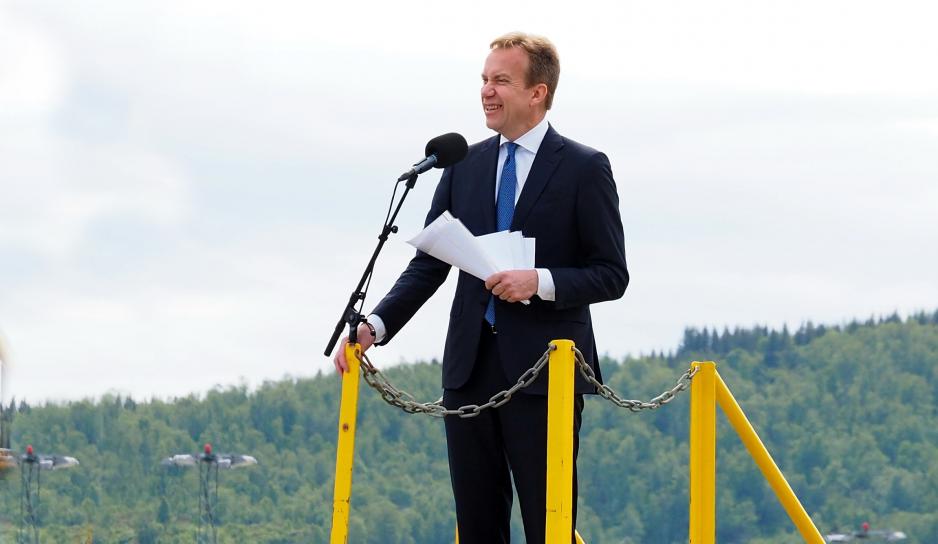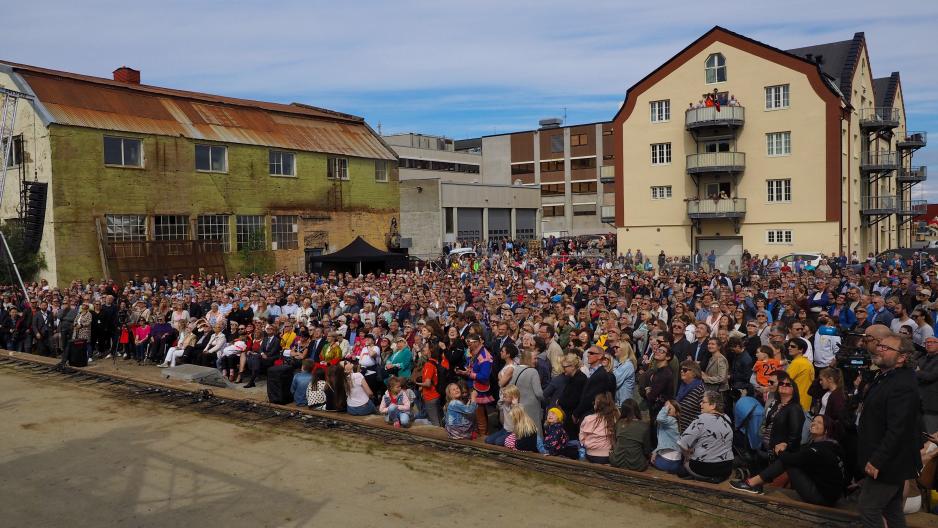- Culture will keep us together

Photo: Foreign Minister Brende, speaking from Arctic pulpit (Photo: Roger Hennum/Festspillene i Nord-Norge).
"We can use culture to prevent this area from becoming an area of conflict. Today it is an area of co-operation, and culture plays an important role in that."
It isn’t just the artists who want to put culture centre stage in the Arctic.
"We can use culture to prevent this area from becoming an area of conflict. Today it is an area of co-operation, and culture plays an important role in that," announced Børge Brende, the Norwegian foreign minister.
Second time within a week
Had Mr Brende made his statement while in Oslo, it would have been easy to write it off as political platitude. Instead, it was delivered from atop a yellow scaffolding overlooking the harbour in Harstad, in an address during Saturday’s opening of Festspillene i Nord-Norge, an annual cultural festival that this year has artists from all eight Arctic countries on its programme.
Making the statement harder to dismiss still was the fact that it was the second time within a week that a member of the cabinet had been in Harstad to speak about the role culture plays in the Arctic. The first, Linda Hofstad Helleland, the culture minister, was here on Wednesday to address a gathering of performers and civil servants, brought together to come up with ways to promote arts and culture in the Arctic, and to encourage groups from the region to work closer together.
Different perspectives on the state of arts
The gathering, put on with the support of the Norwegian government, was the first of its sort, and Oslo’s overture appears to have been well received.
"The value of a meeting like this," says Christine Lalonde, the curator of indigenous art at the National Gallery of Canada, "is that it offers different perspectives on the state of arts in the Arctic in all its forms, for those who live here and for those who live in the south."
Ensuring there is political interest in national capitals for Northern issues, according to Ms Lalonde, who specialises in Inuit art, is essential for ensuring there is sufficient funding for arts and culture programmes in the region. Ultimately, however, she believes that initiatives to showcase Arctic art must come from the region itself.
Others will feel obliged to follow suit
"A lot still needs to be done, but an event like this shows that culture doesn’t always need to be on the sidelines of Arctic events. It can be the point of the event itself," she says.
That culture will again take centre stage appears likely. Finland has expressed interest in staging a similar gathering in Rovaniemi in two years’ time. Canadian representatives said they were also keen to host at some point.
"And, if you get three in a row," one official says, "then others will feel obliged to follow suit. That puts you on your way to making it permanent."
We can determine own future
Agreeing to talk about culture may prove easier than agreeing on what the aim of such discussions should be. Some, including Ms Helleland, mentioned the commercial potential of a well-defined culture, not least when coupled with tourism. Others argued that a strong culture was a sign of a healthy community, and can perhaps contribute to reconciliation between Northern populations and national capitals.
Mr Brende’s view, that culture across borders has an ameliorating effect, was also repeated frequently. In the end, it is likely all three topics, and more, will be elements of further discussions, reckon those on hand last week.
"The important thing," says Maria Utsi, the lead organiser for both of the Harstad events, "is that we find culture’s place in North. If we can tell our own story, we can determine own future."
A stronger sense of identity
Another challenge for those here in Harstad has been to pin down just what Northern culture is. The Norwegian hosts took a stab, emphasising factors such as where it is created, by whom, and what its point is. Few would disagree, but there were also those who warned against overlooking subjective notions.
"I can’t define what Northern culture is, but I know what it is when I see it," says Helene Hokland, the director of Amiff, a Norwegian film festival. "It’s something that gives me a stronger sense of identity."
The author is the former editor of The Arctic Journal. He will be covering Arctic Arts Summit and Festspillene i Nord-Norge at the invitation of the organisers.

Saturday’s opening of Festspillene i Nord-Norge, an annual cultural festival that this year has artists from all eight Arctic countries on its programme. (Photo: Roger Hennum/Festspillene i Nord-Norge).
